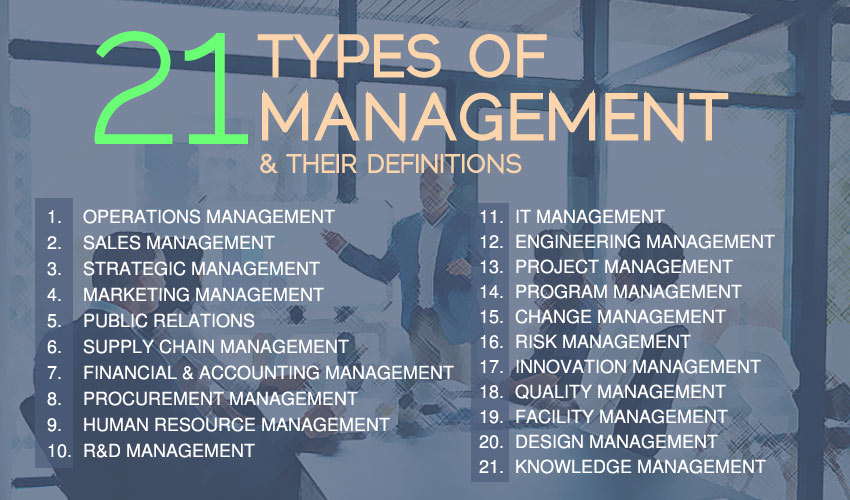Types of Management with the Definitions

The simple meaning of management is performing things right. Management means organizing and coordinating a business’s activities to attain specific objectives. In other words, management is planning, organizing, controlling and leading an organization to attain its specific goals. Management has different aspects. So, managers have different styles and management is of different types.
Types of Management
The most common and mentionable types of management are as follows:
- Operations Management
- Sales Management
- Strategic Management
- Marketing Management
- Public Relations
- Supply Chain Management
- Financial and Accounting Management
- Procurement Management
- Human Resource Management
- Research & Development (R & D) Management
- Information Technology Management
- Engineering Management
- Project Management
- Program Management
- Change Management
- Risk Management
- Innovation Management
- Quality Management
- Facility Management
- Design Management
- Knowledge Management
Each of the types is defined below
Operations Management
Operations management focuses on designing and controlling the production process of goods or services to generate the highest possible efficiency within a company. Its main motive is maximizing the company’s profit. It broadly describes all aspects of production management from manufacturing to retailing.
Sales Management
Sales management deals with the management of sales operations, sales teams, sales accounts or sales territories of an organization. Sales management coordinates people with resources to achieve a sales goal.
Strategic Management
Strategic management deals with the entire process of an organization’s strategy development and its implementation to grow and sustain competitive advantage. It’s a function of an executive which may be reported to the organization’s owners.
Marketing Management
Marketing management is the management of products, brands, marketing strategies, and promotions. According to Kotler and Keller, "Marketing management is 'the art and science of choosing target markets and getting, keeping, and growing customers through creating, delivering, and communicating superior customer value'
Public Relations
Public relations deal with the management of communications between the public and an organization. It is the way individuals, companies and organizations communicate with media and the public. A public relations specialist shares information, views, and opinions with the target audience indirectly or directly through media for creating and maintaining a positive image and building a good relationship with the audience.
Supply Chain Management
Supply chain management is the management of the process of a product’s or service’s movement from supplier to consumer. It manages the goods’ and services’ flow and involves all processes which transform raw materials into products. It includes the active flow of a business’s supply-related functions for maximizing customer value and gaining a competitive advantage in the market.
Financial and Accounting Management
Financial and accounting management deals with the management of financial and accounting functions, teams and processes. Every business or person gets itself or herself or himself in economic functions. All businesses perform economic/ financial functions. Financial management and accounting management are related in such a way that accounting provides vital input for financial decision making. But they are different with regards to the management of funds and decision making.
Accounting prepares and examines financial records of the past. On the other hand, Financial management plans to attain different financial objectives.
Also Read: Types of Budgets with Definitions & Description
Procurement Management
Procurement management is the management of goods’ and/or services’ purchasing or obtaining from outside or external sources. All companies deal with this type of management at any point in their business life. Procurement management helps a company to save much money while buying goods and services from external sources.
Human Resource Management
Human resource management takes care of attracting, recruiting, training, paying, rewarding employees and motivating and managing employees’ performance. Employees are human resources which play a key role in developing and managing the culture of an organization. No product or service is possible to produce without the help of human resources. So, human resource management is one of the most important tasks and departments of an organization.
Research & Development (R&D) Management
Research & Development (R & D) Management manages the teams and processes of research and development. In this ever-changing technological world, companies are needed to be innovative, develop new products and improve the existing products. In this context, R & D hold immense importance in companies for gaining competitive advantage. R & D management plays a significant role in the improved or better performance of a company.
Information Technology (IT) Management
Information technology management deals with the management of information technology processes and teams. It is the process by which all information technology-related resources are managed as per the company’s needs and priorities. This involves tangible resources such as computers, people, networking hardware and intangible resources such as data and software.
Engineering Management
Engineering management manages the engineering applications for business solutions. For instance, construction, manufacturing, and new product development. Engineering management is the combination of an engineer’s technical skills with business skills and acumen.
Project Management
Project management means the planning, organizing and controlling of projects.
Program Management
Program management is the management of the continuing projects’ portfolio.
Change Management
Change management deals with the application of a systematic approach to change in business. The motive of change management is helping teams and organizations make smooth transformations or changes to target conditions.
Risk Management
Risk management identifies, assesses and controls the chances that processes and objectives may face negative consequences.
Innovation Management
Innovation management manages innovation processes e.g. research and development, strategy, or organizational changes.
Quality Management
Quality management manages the planning of quality, its controlling, its assurance and its improvement.
Facility Management
Facility management manages facilities e.g. offices, branches, data centers, and network operations centers.
Design Management
Design management means managing design processes e.g. visiting card design, business card design, new product design, brochure design, etc.
Knowledge Management
Knowledge management deals with the management of creation, identification, distribution, representation and application of knowledge. Nowadays it is a critical field in an economy which is knowledge driven.

